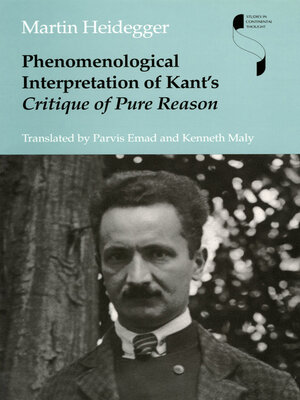Phenomenological Interpretation of Kant's Critique of Pure Reason
ebook ∣ Studies in Continental Thought
By Martin Heidegger

Sign up to save your library
With an OverDrive account, you can save your favorite libraries for at-a-glance information about availability. Find out more about OverDrive accounts.
Find this title in Libby, the library reading app by OverDrive.



Search for a digital library with this title
Title found at these libraries:
| Library Name | Distance |
|---|---|
| Loading... |
The eminent philosopher delivers an illuminating interpretation of Kant's magnum opus in what is itself a significant work of Western philosophy.
The text of Martin Heidegger's 1927–28 university lecture course on Emmanuel Kant's Critique of Pure Reason presents a close interpretive reading of the first two parts of this masterpiece of modern philosophy. In this course, Heidegger continues the task he enunciated in Being and Time as the problem of dismantling the history of ontology, using temporality as a clue.
Heidegger demonstrates that the relation between philosophy, ontology, and fundamental ontology is rooted in the genesis of the modern mathematical sciences. He also shows that objectification of beings as beings is inseparable from knowledge a priori, the central problem of Kant's Critique. He concludes that objectification rests on the productive power of imagination, a process that involves temporality, which is the basic constitution of humans as beings.
The text of Martin Heidegger's 1927–28 university lecture course on Emmanuel Kant's Critique of Pure Reason presents a close interpretive reading of the first two parts of this masterpiece of modern philosophy. In this course, Heidegger continues the task he enunciated in Being and Time as the problem of dismantling the history of ontology, using temporality as a clue.
Heidegger demonstrates that the relation between philosophy, ontology, and fundamental ontology is rooted in the genesis of the modern mathematical sciences. He also shows that objectification of beings as beings is inseparable from knowledge a priori, the central problem of Kant's Critique. He concludes that objectification rests on the productive power of imagination, a process that involves temporality, which is the basic constitution of humans as beings.







